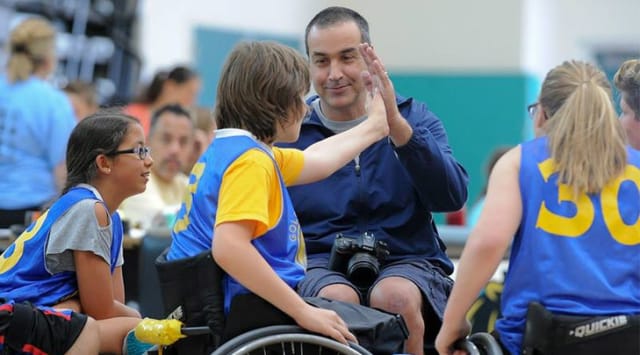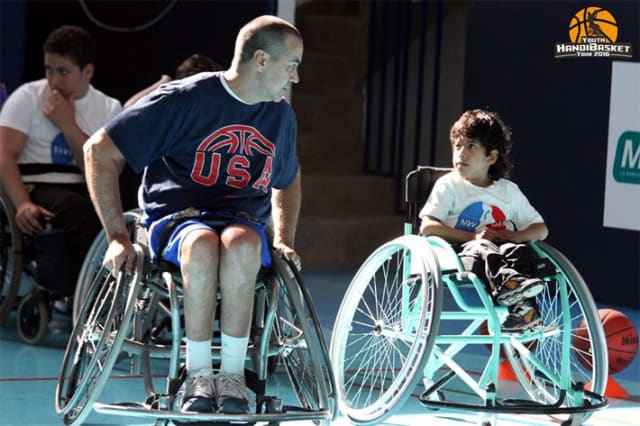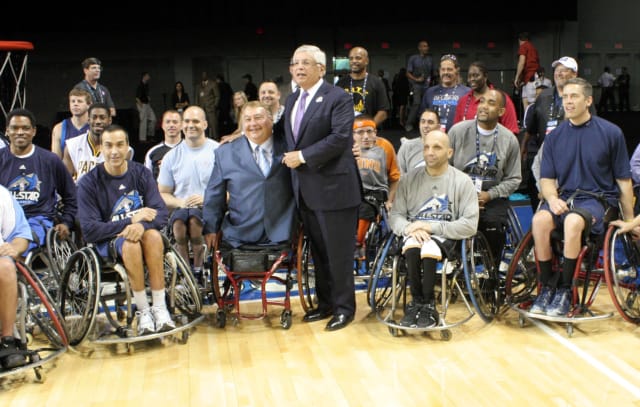These are the real stars
CHARLOTTE (Steve Goldberg's Wheel World) - The NBA All Star celebration in Toronto next week will not have, for the first time since 1998, the NBA/NWBA All Star Wheelchair Basketball Classic.
CHARLOTTE (Steve Goldberg's Wheel World) - I was disappointed to learn this week that the NBA All Star week in Toronto that begins on Feb. 12 will not have, for the first time since 1998, the NBA/NWBA All Star Wheelchair Basketball Classic. The game that brought together the best players from NBA affiliated wheelchair teams in the U.S. and Canada was inaugurated in New York after a couple of very successful exhibition games that began at All Star Week in Phoenix a few years earlier.
While there won't be a game for the stars of the adult teams affiliated with NBA clubs, the annual wheelchair basketball clinic presented by NBA Cares that the athletes participated in will still be held, this time organized by Wheelchair Basketball Canada.
"We are happy to be part of the All Star weekend with the clinic and be able to showcase our sport," says Wendy Gittens, the executive director of Wheelchair Basketball Canada.
Overseeing the coaching aspect will be Canada's High Performance and National Academy Director Mike Frogley While full details for the clinic have yet to be released by the NBA, it is expected to be held on Sunday, February 14 at the Ricoh Coliseum. The NBA All-Star Game will played that night at the Air Canada Centre. News about All Star Week can be found here.
The Association has been putting a lot of effort into building the Jr. NBA program which has included working with the NWBA to bring aboard kids wheelchair basketball teams across the country.
Then, by coincidence or by fate - I'm good either way - I was led by a message on Facebook to an article written by Zimra Vigoda, the mother of a young wheelchair basketball player. The title made a big claim.
Wheelchair basketball seriously changed my son’s life. -Vigoda
It started with this description of an encounter between her then 10 year old son and his coach.
"Come here," he said to my 10-year-old son. His tone was calm but firm. "If I ever see behavior like that again, you’ve ended your wheelchair basketball career, and this will have been your last tournament."
The coach was Trooper Johnson, a former fixture on the USA Paralympic Team, now an assistant coach with the USA women. He is also the coach of the Bay Area Outreach and Recreation Program (BORP) Junior Road Warriors He had an issue with the young man's refusal to shake hands with the other team after yet another loss on the day.

A former fixture on the USA Paralympic and World Championship teams as a player, Lawrence "Trooper" Johnson's main focus now is developing the next generations. Photo: Scot Goodman.
Johnson is as competitive an athlete as I've ever covered but he has always understood and demonstrated the value of sportsmanship and what that means far beyond the court.
He challenged the frustrated young player to do the same. According to his mother, the challenge was accepted along with a discipline to improve in other ways and a realization of what he could do that was stronger than dwelling on what he couldn't.
"There was no turning back," she wrote. "Born with a rare orthopedic condition, my little boy spent his first 10 years of life in pain, limping after his peers while trying to catch up as they ran faster and faster - in marathons, with soccer balls, and with basketballs. He watched his friends race bikes and compete in Judo competitions, but it wasn’t until the day of the tournament he experienced, first-hand, the magic of a competitive team sport. He was hooked."
Much of that, maybe all of it, came from the boy's love of the game and the camaraderie of the team. The family has moved from the Bay Area to Israel where he is now playing with the junior national team with higher aspirations than he ever would have had years ago.
The ability to be such a positive influence on young people is what makes Johnson and so many other coaches out there, in basketball and every other sport, the real all stars in my opinion.

Johnson recently went to Morocco and Algeria on behalf of the NWBA and the U.S. State Department's Sports United program to lead clinics for players and coaches to help improve their game and their lives.
By another coincidence, Trooper Johnson represented the Golden State Road Warriors - I love that name; it's so Mad Max - in that very first NBA/NWBA All Star Wheelchair Basketball Classic in 1998, scoring the first basket on an NBA distance three-pointer and 25 for the game as the West beat the East 77-72.

Former NBA Commissioner David Stern (USA) with former NWBA President Dick Bryant and the players competing at the 2012 NBA/NWBA All-Star Wheelchair Classic in Orlando, Florida. Photo: Steve Goldberg
"To be finally recognized by our counterparts at the NBA is huge," said Australian Troy Sachs, who was playing for the Dallas Wheelchair Mavericks at the time. "It shows that the NBA cares about us and we've just got to go ahead and do our job now."
And that job then is the same job now. Just as the NBA All Stars will motivate young boys and girls to play the game, so did the 17 wheelchair All Star games played since 1998, providing not just a reward to those who were in it but inspiration and aspiration to those kids in wheelchairs who could envision that as an achievable goal in spite of other limitations.
I hope to see it return at the All Star Week next year.
Steve Goldberg
FIBA
FIBA's columnists write on a wide range of topics relating to basketball that are of interest to them. The opinions they express are their own and in no way reflect those of FIBA.
FIBA takes no responsibility and gives no guarantees, warranties or representations, implied or otherwise, for the content or accuracy of the content and opinion expressed in the above article.
To help make this column as inclusive as possible, please send any national or international event information, story suggestions, or comments to wheelworldmail@gmail.com.